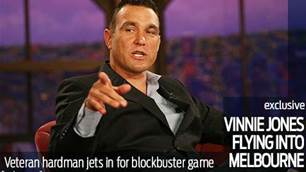Vinnie Grella isn’t the name on most Socceroo fans’ lips when it comes to their favourite player. But as he told FourFourTwo, he’s not in it for the fame. A couple of trophies will do
The “holding midfielder” is a position that doesn’t even sound glamorous. Even Serie A fans – where everyone focusses primarily on tactics – don’t overtly and publicly celebrate the importance of the role.
However sides that use holding midfielders effectively have been the most successful in the modern game. Real Madrid, Manchester United and Arsenal’s recent successes have all come when they’ve used a midfield anchor.
Granted, Claude Makelele, Roy Keane and Patrick Vieira are obscenely famous but the lion’s share of the praise has always gone to team-mates. Think of those great sides and you think Zidane, Beckham and Henry. In Makelele and Vieira’s cases, their exits from Madrid and Arsenal signalled drastic drops in form for their old sides. This was no coincidence.
“I remember Roy Keane…” says Vince Grella, Australia’s own version of the most important man on the pitch. “Even though he was a big part of the Manchester team, he was always second or third to Beckham and those guys that were taking the limelight. But I don’t think he would have been too worried.
“I believe it always comes back to the coaching staff and how much they appreciate what you do and how important it is for them. When I was with Guus Hiddink, at the start he didn’t really like the way I was playing but then towards the end of the World Cup he was calling me constantly during a game, making sure I was on top of certain situations. For me that was hugely satisfying personally. You know, this popularity thing doesn’t worry me. It’s never been a problem and doesn’t bother me at all. I really like to keep low key.”
Since going their separate ways at the end of the World Cup, it wasn’t until the games against Paraguay and Bahrain in early October that the European-based Socceroos were reunited to play again together. Scorelines aside, fans were relieved to see the team’s slick ball movement from the Hiddink days was still in place.
“There’s (now) just this confidence. Obviously we’ve got to see when we go through a bad spell, when things are more difficult to test the character of the team. Things are going good and the ball’s bouncing our way. Maybe results-wise we’re missing the bigger point, but we’re playing beautiful soccer.
“For Australia to show a South American team how to pass the ball…
I tell you what, you wouldn’t have dreamed of that 10 years ago. Against Paraguay, I can’t remember an Australian team passing a ball like that. South Americans are the kings of possession and passing the ball. They are the kings. We showed them how to do it,” he enthuses.
With Grella and the likes of Bresciano, Cahill and Culina forming the core of the side heading toward the 2010 World Cup, things are progressing well for the Socceroos. While there are high-profile hiccups on the Hyundai A-League front and debate continues to rage about our coaches, the Australian team is finally maturing into the world class side we all hoped it would. With the Socceroos showing Paraguay a thing or two and having been schooled by Master Hiddink, what style does Grella think we are actually playing?
“I don’t reckon it’s anyone’s style. We are combining different types of football together, which is not easy and I only think it’s going to get better. At some stages, we can lose each other because everyone goes back to their club and plays a different system. We then come back and change styles. It’s just our style now.
“We’ve got a lot of time still, but these next two years will be important. Once you get to the World Cup, there’s no more mucking around. You also have to give new guys a chance to break in. How many games they might need, I don’t know.
“(In new players) I always try and look at the attitude, the passion, the way they feel about being involved in the team… the way that they really feel it inside that they’re giving something to the team. If their intentions are good, then you wait for them. If they are making up the numbers and causing trouble then I don’t think there’s any room for them in the team. That’s the type of mentality we have in our team.
“The Asian Cup has got to be the goal for us, and obviously straight after that we’ve got the World Cup qualifiers. The team’s already got a pretty strong core, so you are only just joining on bits and pieces. We are in good hands,” he declares.
For Socceroo fans, being “in good hands” is all they’ve ever asked for. Being accepted into the Asian Football Confederation has been a godsend, with meaningful matches proving a plus for players and fans alike.
The new problem is that we don’t always get to see Grella and co in action – as witnessed recently against Asian opposition. Our first XI already had club vs country issues to contend with, and a busy schedule with the Socceroos has the potential to escalate things. Tim Cahill’s club boss David Moyes has already targeted the FFA with some choice words and Grella’s best mate Bresciano has weighed in saying, “The FFA want the best team to play too… we are all also looking at our own personal needs [so] it’s not an easy situation to deal with. The only way may be some players having to rest. I think a rotation policy would be a pretty good idea. Most of us have not really had a break for a couple of years. I think everyone deserves a break.”
Grella doesn’t necessarily agree with rotating players in the Socceroo set-up but presses home the real-time issues they face.
“It’s the constant time differences and your body clock. I think to play at this level the small things – your eating, sleeping patterns – they’re all over the place and it’s very hard to keep consistency. For example, we play Wednesday night, leave here Thursday afternoon, we get back on Friday afternoon and we play on a Sunday. Now, to be honest, what physical condition can you been in on Sunday at three o’clock? It’s very hard, but you can’t get around it. They (European players) have such an advantage doing a two-hour flight instead of doing a 26 or 27-hour one.
“Some people don’t really get that picture. You could tell them a hundred times, but until you can do it yourself or try that type of trip… I’ll get to Italy on Friday just before lunch, I’ve got about a one and a half hour car trip to Parma, I get out of the car, they’ll probably give me an hour and I’m training. And on Sunday I play.”
So do Grella’s concerns about rotating two Socceroo teams come down to a belief that the momentum and team performance may suffer?
“To be fair, I don’t know. It’s something that the coaches have to organise. I think it’s a big call and something that they really have to think about. I think the coaches have to study game by game and see how many points we’ve got, how many points we need, who the opposition is, where it is… So many things have to be thought about. This rotation thing… I’m not a big fan of rotation. If you look at the big clubs in Europe that play all those games they don’t do that much rotation and there is a reason for it.”
Of the 23-man World Cup squad, there were just three Italy-based players (Grella, Bresciano and Zeljko Kalac), with the bulk of the team having carved out their careers in England. Australia’s football diet has naturally been dominated by the English game – simply because it’s been more consistently available on TV.
But while Kewell and the gang chased the bright lights of the English Premier League, it was always Italy, and its technical demands, that was the pot at the end of the rainbow for the young Grella and Bresciano.
Grella is now captain at Parma, even if he plays his role down saying he is
a “Sunday fill-in”, but still has hopes of one day running out for a bigger side. And surprisingly, that may not necessarily be in Italy…
“Everyone would like to be at AC Milan at 20-years-old. But you need to be able to play at a team like that… you need a certain level of experience and you need a certain level of personality. And I don’t think I could have played at a bigger club than Parma and Empoli before now but I think these past two years have been crucial for me. I think I’ve taken a little step up. I may be out of my league at an AC Milan or an Inter Milan but the next notch under that, I reckon I’m up for.
“I’m probably staying at Parma this year – it’ll be another important season for me just to get just that little bit more experience. At your AC Milans and these types of clubs, it would not be easy to play regularly there. Whether you play is based on so many factors. It’s the coach, what players are available at the time… it could be so many things.”
Could we even possibly see him leaving the highly-regarded Serie A to join the England-based Australians?
“As the years are passing, I’m opening my eyes a little more to the English league. I’ve always been a bit biased towards Italy. What’s happened over a few years (here) has maybe suffocated the league a little bit, maybe taken away little bit of its prestige.
“The dream is always to play for the best. I never dreamed of playing for Empoli, even though I’m so grateful for the opportunity that they gave me and for what they taught me. It’s actually a place where I have a house and I spend a lot of my time there and I love the place. The people around the club are unbelievable, but I never dreamed of playing in a club like that. I always dreamed of playing at an AC Milan, a Juventus. But I’ll never say never,” he says.
Aside from making his living in Italy, Grella has obvious deeper connections there. His family background is Italian and his wife Barbara is Italian.
But amongst all the golden moments produced during the World Cup, it’s the most infamous one that overshadows them all: being knocked out by Italy. Australians’ reactions were suitably mixed with feelings of being stunned, angry and sad but little has been reported about what the word ‘on the street’ was in Italy following that match.
Grella is blunt in his assessment and as if he were a boxer, FourFourTwo reckons he’s itching for a re-match.
“Well, to be fair, I sort of closed my ears for a while,” Grella reveals. “But they don’t talk about our game much. They don’t talk about any game much. They really only talk about the fact they are world champions and that’s it. They don’t comment on the games. And they don’t comment on the penalty. Nothing.”
Bresciano and Grella’s careers have now splintered after previously being an inseparable double act. They first played together at Carlton, before turning out for Empoli and Parma. This season, Bresciano has made a high-profile move to Palermo and his form is at an all-time high. After his spectacular goal against Bahrain in Sydney, Bresciano has become a regular scorer for Palermo – scoring one and setting up the other in the recent 2-0 win over AC Milan.
Parma on the other hand, are in the bottom-half of the table and their financial outlook is still bleak.
“It’s a lot different without Mark, because we are missing him on Sunday. We’re not just missing him, we lost six important players from last year from the starting XI.
“Obviously, I’m not really authorised to say, but the financial problems are taking longer than what everyone thought and that’s not helping us. But we are missing him.”
For Vince – who admits that wearing the green and gold gives him more pride than ever before – the question of his “nationality” has always been a tricky one – on both continents.
“It’ll always be like that,” he says of being treated as a foreigner. “Even though I can speak the language and know more about their country than most Italians, you’ll never be an Italian. And in Australia, you’ll never be an Australian. It’s just the way it is. You’re not going to change it. It doesn’t matter what you say or what you do. So you just get on with it. It doesn’t really worry me.The one thing I’m happy about is the respect.”
Marrying his Italian and Australian roots has had another significant impact on the national team. Grella’s tradition of bringing Parmesan cheese and prosciutto into camp is already part of Socceroo folklore, as players eagerly await his Italian treats at camp.
While it makes him even more indispensable to the national cause in Europe, it doesn’t do him much good when he flies back to a camp in Australia.
“(Laughs) I can’t bring it into Australia! The customs are very strict about that thing, but yeah, I do take it with me whenever I have the chance to. I don’t bring it here because I’d be pretty pissed off if they made me throw it in the bin. When we’re in Europe I can bring it with me. I always bring something along for the boys, I know they enjoy it. I get to eat it everyday so, for me it’s not a big deal. Some of the boys in England that don’t get the chance to eat it as often love it!”
Currently, a lot of speculation surrounds some Socceroos and their possible return to the burgeoning A-League but Grella is not even close yet. Even the tantalising prospect of playing in front of 40,000 people in his home town (as Melbourne saw against Sydney in round two) is not enough to lure him from his Italian dream.
“It’s still a bit early to come back, but it’s just good to see that they are kicking on and the league’s going well and they’re getting good support. I still think I’ve got a lot of years in Europe but I would love to come back towards the end. I’m just starting to get to the good bit… I’m enjoying it now and I want to kick on and get to bigger and better things. I will see when the time comes closer, but I still think I would like to come back. When? I don’t know,” he says.
As for who Vince’s influences were when he was a youngster, his heroes have a distinctly antipodean, rather than European, feel.
“There was not any one player in particular,” he says. “It’s funny now actually, John Kosmina is on our coaching staff and he was one of the players that always caught my eye when I was younger. There was Oscar Crino and Ned Zelic was another one. There were a lot. Paul Trimboli was another. I always dreamed that I could play in the national team and that’s why I’m now here.”
Vince Grella is not “just” a holding midfielder. He is Australia’s holding midfielder. And while he doesn’t seek it, Grella deserves plenty of kudos for getting us to Germany and steering us through the tricky rounds of the World Cup.
While he may not be seen in the same realm as Vieira or Makelele, a Socceroos team without him would take just as big a blow as Arsenal and Real Madrid did without their anchors. Worst of all, we could lose our new found “respect” in world football faster than we got it.
However sides that use holding midfielders effectively have been the most successful in the modern game. Real Madrid, Manchester United and Arsenal’s recent successes have all come when they’ve used a midfield anchor.
Granted, Claude Makelele, Roy Keane and Patrick Vieira are obscenely famous but the lion’s share of the praise has always gone to team-mates. Think of those great sides and you think Zidane, Beckham and Henry. In Makelele and Vieira’s cases, their exits from Madrid and Arsenal signalled drastic drops in form for their old sides. This was no coincidence.
“I remember Roy Keane…” says Vince Grella, Australia’s own version of the most important man on the pitch. “Even though he was a big part of the Manchester team, he was always second or third to Beckham and those guys that were taking the limelight. But I don’t think he would have been too worried.
“I believe it always comes back to the coaching staff and how much they appreciate what you do and how important it is for them. When I was with Guus Hiddink, at the start he didn’t really like the way I was playing but then towards the end of the World Cup he was calling me constantly during a game, making sure I was on top of certain situations. For me that was hugely satisfying personally. You know, this popularity thing doesn’t worry me. It’s never been a problem and doesn’t bother me at all. I really like to keep low key.”
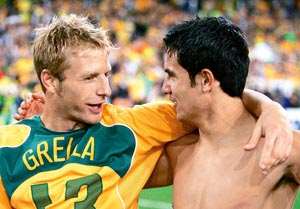 |
| Are our midfielders plotting more success on the big stages? |
Since going their separate ways at the end of the World Cup, it wasn’t until the games against Paraguay and Bahrain in early October that the European-based Socceroos were reunited to play again together. Scorelines aside, fans were relieved to see the team’s slick ball movement from the Hiddink days was still in place.
“There’s (now) just this confidence. Obviously we’ve got to see when we go through a bad spell, when things are more difficult to test the character of the team. Things are going good and the ball’s bouncing our way. Maybe results-wise we’re missing the bigger point, but we’re playing beautiful soccer.
“For Australia to show a South American team how to pass the ball…
I tell you what, you wouldn’t have dreamed of that 10 years ago. Against Paraguay, I can’t remember an Australian team passing a ball like that. South Americans are the kings of possession and passing the ball. They are the kings. We showed them how to do it,” he enthuses.
With Grella and the likes of Bresciano, Cahill and Culina forming the core of the side heading toward the 2010 World Cup, things are progressing well for the Socceroos. While there are high-profile hiccups on the Hyundai A-League front and debate continues to rage about our coaches, the Australian team is finally maturing into the world class side we all hoped it would. With the Socceroos showing Paraguay a thing or two and having been schooled by Master Hiddink, what style does Grella think we are actually playing?
“I don’t reckon it’s anyone’s style. We are combining different types of football together, which is not easy and I only think it’s going to get better. At some stages, we can lose each other because everyone goes back to their club and plays a different system. We then come back and change styles. It’s just our style now.
“We’ve got a lot of time still, but these next two years will be important. Once you get to the World Cup, there’s no more mucking around. You also have to give new guys a chance to break in. How many games they might need, I don’t know.
“(In new players) I always try and look at the attitude, the passion, the way they feel about being involved in the team… the way that they really feel it inside that they’re giving something to the team. If their intentions are good, then you wait for them. If they are making up the numbers and causing trouble then I don’t think there’s any room for them in the team. That’s the type of mentality we have in our team.
“The Asian Cup has got to be the goal for us, and obviously straight after that we’ve got the World Cup qualifiers. The team’s already got a pretty strong core, so you are only just joining on bits and pieces. We are in good hands,” he declares.
For Socceroo fans, being “in good hands” is all they’ve ever asked for. Being accepted into the Asian Football Confederation has been a godsend, with meaningful matches proving a plus for players and fans alike.
The new problem is that we don’t always get to see Grella and co in action – as witnessed recently against Asian opposition. Our first XI already had club vs country issues to contend with, and a busy schedule with the Socceroos has the potential to escalate things. Tim Cahill’s club boss David Moyes has already targeted the FFA with some choice words and Grella’s best mate Bresciano has weighed in saying, “The FFA want the best team to play too… we are all also looking at our own personal needs [so] it’s not an easy situation to deal with. The only way may be some players having to rest. I think a rotation policy would be a pretty good idea. Most of us have not really had a break for a couple of years. I think everyone deserves a break.”
Grella doesn’t necessarily agree with rotating players in the Socceroo set-up but presses home the real-time issues they face.
“It’s the constant time differences and your body clock. I think to play at this level the small things – your eating, sleeping patterns – they’re all over the place and it’s very hard to keep consistency. For example, we play Wednesday night, leave here Thursday afternoon, we get back on Friday afternoon and we play on a Sunday. Now, to be honest, what physical condition can you been in on Sunday at three o’clock? It’s very hard, but you can’t get around it. They (European players) have such an advantage doing a two-hour flight instead of doing a 26 or 27-hour one.
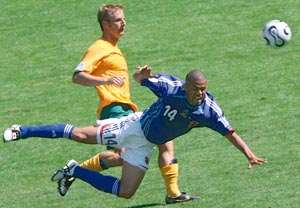 |
| "Getting in the way" of Japan's Alessandro Santos |
“Some people don’t really get that picture. You could tell them a hundred times, but until you can do it yourself or try that type of trip… I’ll get to Italy on Friday just before lunch, I’ve got about a one and a half hour car trip to Parma, I get out of the car, they’ll probably give me an hour and I’m training. And on Sunday I play.”
So do Grella’s concerns about rotating two Socceroo teams come down to a belief that the momentum and team performance may suffer?
“To be fair, I don’t know. It’s something that the coaches have to organise. I think it’s a big call and something that they really have to think about. I think the coaches have to study game by game and see how many points we’ve got, how many points we need, who the opposition is, where it is… So many things have to be thought about. This rotation thing… I’m not a big fan of rotation. If you look at the big clubs in Europe that play all those games they don’t do that much rotation and there is a reason for it.”
Of the 23-man World Cup squad, there were just three Italy-based players (Grella, Bresciano and Zeljko Kalac), with the bulk of the team having carved out their careers in England. Australia’s football diet has naturally been dominated by the English game – simply because it’s been more consistently available on TV.
But while Kewell and the gang chased the bright lights of the English Premier League, it was always Italy, and its technical demands, that was the pot at the end of the rainbow for the young Grella and Bresciano.
Grella is now captain at Parma, even if he plays his role down saying he is
a “Sunday fill-in”, but still has hopes of one day running out for a bigger side. And surprisingly, that may not necessarily be in Italy…
“Everyone would like to be at AC Milan at 20-years-old. But you need to be able to play at a team like that… you need a certain level of experience and you need a certain level of personality. And I don’t think I could have played at a bigger club than Parma and Empoli before now but I think these past two years have been crucial for me. I think I’ve taken a little step up. I may be out of my league at an AC Milan or an Inter Milan but the next notch under that, I reckon I’m up for.
“I’m probably staying at Parma this year – it’ll be another important season for me just to get just that little bit more experience. At your AC Milans and these types of clubs, it would not be easy to play regularly there. Whether you play is based on so many factors. It’s the coach, what players are available at the time… it could be so many things.”
Could we even possibly see him leaving the highly-regarded Serie A to join the England-based Australians?
“As the years are passing, I’m opening my eyes a little more to the English league. I’ve always been a bit biased towards Italy. What’s happened over a few years (here) has maybe suffocated the league a little bit, maybe taken away little bit of its prestige.
“The dream is always to play for the best. I never dreamed of playing for Empoli, even though I’m so grateful for the opportunity that they gave me and for what they taught me. It’s actually a place where I have a house and I spend a lot of my time there and I love the place. The people around the club are unbelievable, but I never dreamed of playing in a club like that. I always dreamed of playing at an AC Milan, a Juventus. But I’ll never say never,” he says.
Aside from making his living in Italy, Grella has obvious deeper connections there. His family background is Italian and his wife Barbara is Italian.
But amongst all the golden moments produced during the World Cup, it’s the most infamous one that overshadows them all: being knocked out by Italy. Australians’ reactions were suitably mixed with feelings of being stunned, angry and sad but little has been reported about what the word ‘on the street’ was in Italy following that match.
Grella is blunt in his assessment and as if he were a boxer, FourFourTwo reckons he’s itching for a re-match.
“Well, to be fair, I sort of closed my ears for a while,” Grella reveals. “But they don’t talk about our game much. They don’t talk about any game much. They really only talk about the fact they are world champions and that’s it. They don’t comment on the games. And they don’t comment on the penalty. Nothing.”
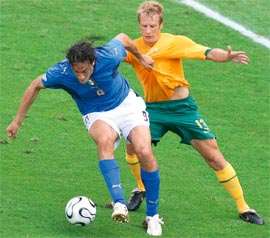 |
| Luca Toni wants Grella's no. 13 jersey |
Bresciano and Grella’s careers have now splintered after previously being an inseparable double act. They first played together at Carlton, before turning out for Empoli and Parma. This season, Bresciano has made a high-profile move to Palermo and his form is at an all-time high. After his spectacular goal against Bahrain in Sydney, Bresciano has become a regular scorer for Palermo – scoring one and setting up the other in the recent 2-0 win over AC Milan.
Parma on the other hand, are in the bottom-half of the table and their financial outlook is still bleak.
“It’s a lot different without Mark, because we are missing him on Sunday. We’re not just missing him, we lost six important players from last year from the starting XI.
“Obviously, I’m not really authorised to say, but the financial problems are taking longer than what everyone thought and that’s not helping us. But we are missing him.”
For Vince – who admits that wearing the green and gold gives him more pride than ever before – the question of his “nationality” has always been a tricky one – on both continents.
“It’ll always be like that,” he says of being treated as a foreigner. “Even though I can speak the language and know more about their country than most Italians, you’ll never be an Italian. And in Australia, you’ll never be an Australian. It’s just the way it is. You’re not going to change it. It doesn’t matter what you say or what you do. So you just get on with it. It doesn’t really worry me.The one thing I’m happy about is the respect.”
Marrying his Italian and Australian roots has had another significant impact on the national team. Grella’s tradition of bringing Parmesan cheese and prosciutto into camp is already part of Socceroo folklore, as players eagerly await his Italian treats at camp.
While it makes him even more indispensable to the national cause in Europe, it doesn’t do him much good when he flies back to a camp in Australia.
“(Laughs) I can’t bring it into Australia! The customs are very strict about that thing, but yeah, I do take it with me whenever I have the chance to. I don’t bring it here because I’d be pretty pissed off if they made me throw it in the bin. When we’re in Europe I can bring it with me. I always bring something along for the boys, I know they enjoy it. I get to eat it everyday so, for me it’s not a big deal. Some of the boys in England that don’t get the chance to eat it as often love it!”
Currently, a lot of speculation surrounds some Socceroos and their possible return to the burgeoning A-League but Grella is not even close yet. Even the tantalising prospect of playing in front of 40,000 people in his home town (as Melbourne saw against Sydney in round two) is not enough to lure him from his Italian dream.
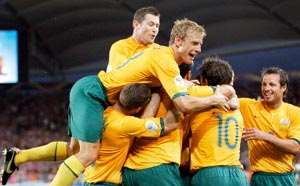 |
| Team-mates celebrate Vinnie's latest delivery of cheeses |
“It’s still a bit early to come back, but it’s just good to see that they are kicking on and the league’s going well and they’re getting good support. I still think I’ve got a lot of years in Europe but I would love to come back towards the end. I’m just starting to get to the good bit… I’m enjoying it now and I want to kick on and get to bigger and better things. I will see when the time comes closer, but I still think I would like to come back. When? I don’t know,” he says.
As for who Vince’s influences were when he was a youngster, his heroes have a distinctly antipodean, rather than European, feel.
“There was not any one player in particular,” he says. “It’s funny now actually, John Kosmina is on our coaching staff and he was one of the players that always caught my eye when I was younger. There was Oscar Crino and Ned Zelic was another one. There were a lot. Paul Trimboli was another. I always dreamed that I could play in the national team and that’s why I’m now here.”
Vince Grella is not “just” a holding midfielder. He is Australia’s holding midfielder. And while he doesn’t seek it, Grella deserves plenty of kudos for getting us to Germany and steering us through the tricky rounds of the World Cup.
While he may not be seen in the same realm as Vieira or Makelele, a Socceroos team without him would take just as big a blow as Arsenal and Real Madrid did without their anchors. Worst of all, we could lose our new found “respect” in world football faster than we got it.
Related Articles
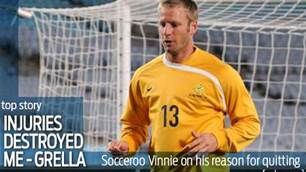
Vince Grella: Injury destroyed me

Jones: I could have ended up like Gazza
